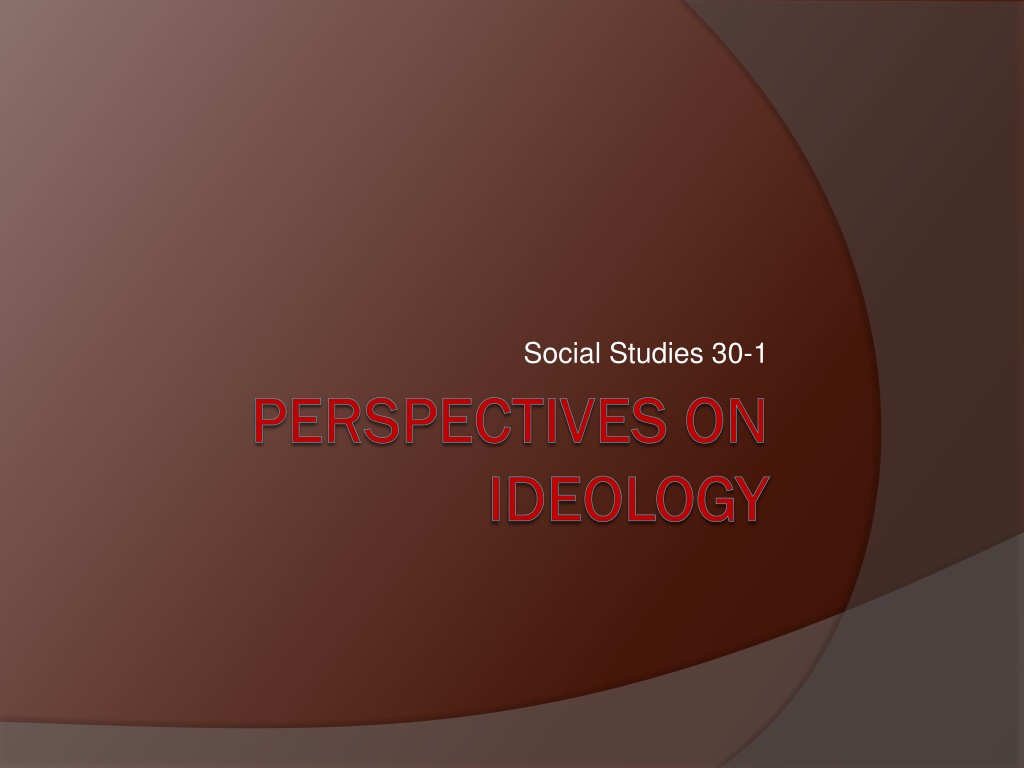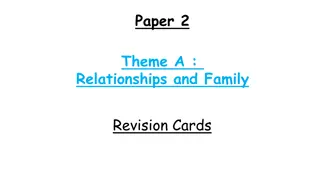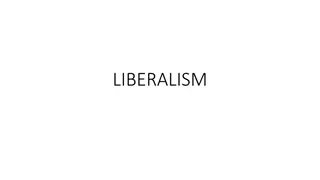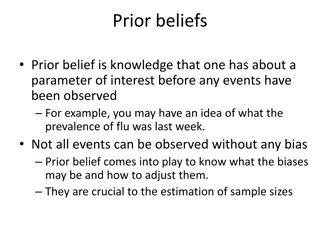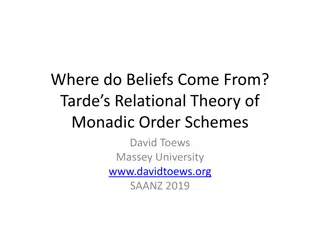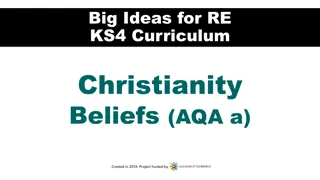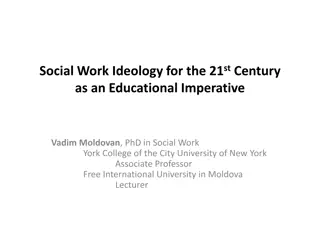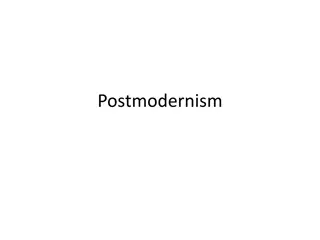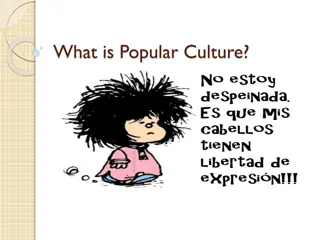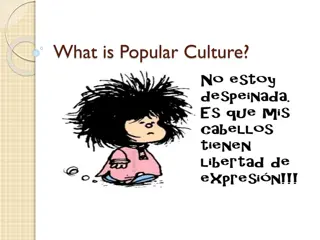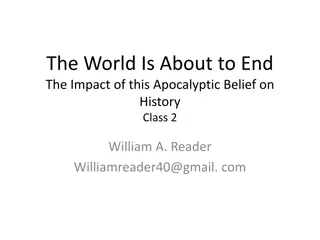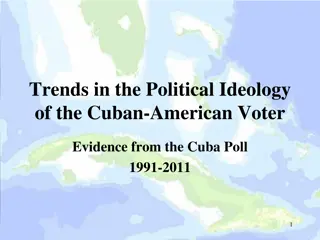Understanding Ideology and Society: Perspectives and Beliefs
Explore the significance of ideology in shaping societal perspectives, beliefs, and values. Understand the impact of ideologies on laws, societal structures, and individual behavior. Delve into concepts such as liberalism, individualism, and collectivism to gain insights into human societies through different ideological lenses.
Download Presentation

Please find below an Image/Link to download the presentation.
The content on the website is provided AS IS for your information and personal use only. It may not be sold, licensed, or shared on other websites without obtaining consent from the author. Download presentation by click this link. If you encounter any issues during the download, it is possible that the publisher has removed the file from their server.
E N D
Presentation Transcript
Social Studies 30-1 PERSPECTIVES ON PERSPECTIVES ON IDEOLOGY IDEOLOGY
Unit One Identity & Ideology Identity & Ideology
Perspectives on Ideology Any group of people-a society-that has ever had the luxury of being able to think about its existence eventually arrives at a general understanding of how the world is and how the world ought to be. Such an understanding can be called ideology. Essentially an ideology is a belief or set of thoughts that guides people and/or groups. -What are humans like and why do they act the way they do? -What is the nature of society? -What is the role of the individual in society?
Perspective- the outlook of a particular group of people with the same age, culture, economics, faith, language, or other shared quality. Point of View- an individual s opinion, based on that individual s personal experience and values
Think about how ideology affects society: Why do we have the laws we do? Why are those laws different from some other countries? Who is right? Is our society the right one? Dystopias-fictional societies that are deliberately portrayed as negative-where ideology is used to control an unwitting population Review the other examples in your book on pages 7-8
Understanding Humans & Societies through Ideologies Ideas are important because they are [part of] the reason why people act in certain ways. Activity: 1. Put the quotes on pages 9 & 10 in order based on what you think is the most true to the least true. 2. Write down a list of all the qualities or characteristics that you think make humans human. How many are ideological and how many biological?
Liberalism Liberalism What do you believe in? What do you value? Where do your beliefs fit in? How is your belief system developed?
Many beliefs in society boil down to: Individualism- a current of thinking that values the freedom and worth of the individual, sometimes over the security and harmony of the group. Collectivism- a current of thinking that values the goals of the group and the common good over the goals of any individual When you meet someone for the first time what do you ask them? Generally you ask their name, where they go to school, what they do for a job, etc. Is this individualistic or collectivistic? In a capitalist society such as Canada which line of thinking do we embrace more? Should societies force people to do a job that they are best suited to do based on their skills or allow them to choose their own future?
Ideology in History Ideology in History Thomas Hobbes(1588-1679) English Philosopher He believed human nature is characterized by fear, violence, and dangerous self-interest (extreme individualism) He believed that if everyone is free, then everyone is in danger; that security is more important than freedom He did not think it was possible to have both security and freedom
John Locke (1632-1704) Also an English philosopher Unlike Hobbes, Locke believed humans are rational, intelligent, and reasonable. Most people at this time believed in divine right (leaders were chosen by God and therefore had absolute power). Locke, on the contrary, believed the source of power was the people themselves. He believed that any government action had to be justified by popular consent (democracy)
Jean-Jacques Rousseau (1712-1778) Swiss Philosopher Believed people are inherently good but have been corrupted by society and civilization Believed men are naturally free and equal Wanted humans to go back to these natural, good characteristics He believed the will of the people was the absolute authority but, unlike Locke, did not believe in representative democracy He believed citizens should make the laws directly
Chapter One Identity & Ideologies Identity & Ideologies To what extent are ideology and identity interrelated?
Understandings of Identity Understandings of Identity Understand: Personal Identity Collective Identity Beliefs and Values Ideology can also influence identity, it is a set of principles that explain our world and our place in it.
Universal Truths It may be tempting to think that our belief system should be universal, that what we hold to be true is not just true for ourselves but for everyone Some philosophical thinkers throughout history have argued that there are universal truths while others have argued there are not The fact that there is this disagreement means that people must negotiate to some extent with the values and beliefs of others
No one is born hating another person because of the colour of his skin, or his background, or his religion. People must learn to hate... -Nelson Mandela
Fundamentals of Ideology The Nature of Human Beings The Structure of Society Interpretations of History Visions of the Future Progressivism-an umbrella term for various ideologies that advocate moderate political and social reform through government action. Progressive ideologies generally support social justice and the rights of workers.
Characteristics of Ideology Ideologies are all concerned with the essential questions of life, such as: What are humans like, and why do they act the way they do? How should society be organized? How has the world worked in the past? How should it work in the future?
What factors influence individual and collective beliefs and values? Family Influence Relationships to Land Gender Language Religion and Spirituality Ideology Media Environment Government
Theme Nation Description A community of people usually occupying a defined territory, often politically independent A division of society, such as middle class, usually defined by income, wealth, privilege, or role in society Example Kurds: one aspect of ideology is to seek self determination Collectivist values (eliminate class barriers) vs. individualist values (class reflects talent and initiative) Eradicate racial discrimination vs. assertion of superiority Class Race A grouping of human beings distinguished according to biological traits such as skink color
Theme Description Example Environment and relationship to the land The natural surroundings in which a person lives, and his or her connection to those surroundings Green ideology of ecological wisdom Gender The male or female considered as a sociological category Feminism concerned with attaining equal legal and political rights for women Religion The worship of one or more deities and acceptance of a particular set of values associated with that worship Liberalism promotes freedom of religion whereas other ideologies seek to create a society based on the values of a particular religion.
Some key terms: Liberalism- a collection of ideologies all committed to the principle of the dignity and freedom of the individual as the foundation for society. Liberalism has faith in human progress and tends to favour decentralized power, both in political and economic affairs, and respect for the sovereignty of the reasoning individual. Totalitarian- a government system that seeks complete control over the public and private lives of its citizens Hegemony- the political control exerted by one group over another Pluralism- a policy that actively promotes the acceptance of diversity in a society.
What themes and characteristics should my ideology include? The beliefs and values that help make up an individual s identity can influence him or her to adopt an ideology that reflects those beliefs and values. It may influence your actions and choices, provide you with a particular perspective on the world, and determine how individuals relate to one another.
Read the quotations by the 3 very different thinkers on pages 52-56. What kinds of themes are addressed in the 3 speeches? (Compare to the chart on page 51). Which of these themes and characteristics do you find most important? Why? Which thinker s ideas are closest to your own? Tommy Douglas Milton Friedman Ovide Mercredi
Assignment Music and ideology Music is a powerful outlet for creativity and ideas. Your assignment is to find a song that is embedded with beliefs and values that are reflective of an ideology We will listen to these songs briefly at the start of each class over the next couple weeks
Music and ideology Step one: select your piece of music and save on CD or memory key (to bring to class). A functional youtube link is also OK. Step two: locate lyrics of your song and put onto PowerPoint presentation Step three: in your presentation provide some information on your artist (where from? time era? etc ) Step four: on the last slide of PowerPoint answer the following questions Step five: sign up for a day to present
Questions What beliefs and values about human nature are present in the song? What beliefs and values about societal structure are present in the song? What are the key ideological themes focused on? (Explain your reasoning) Do you think music is powerful tool for spreading an ideology? (Why/why not?/consider a comparison to other types of media)
